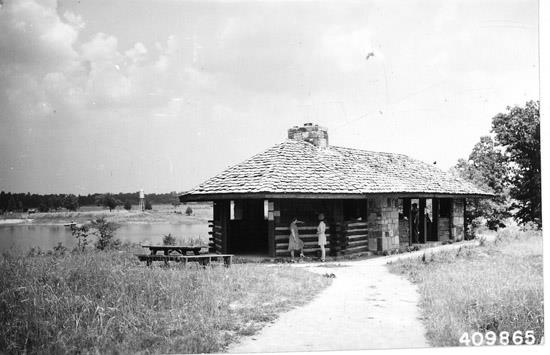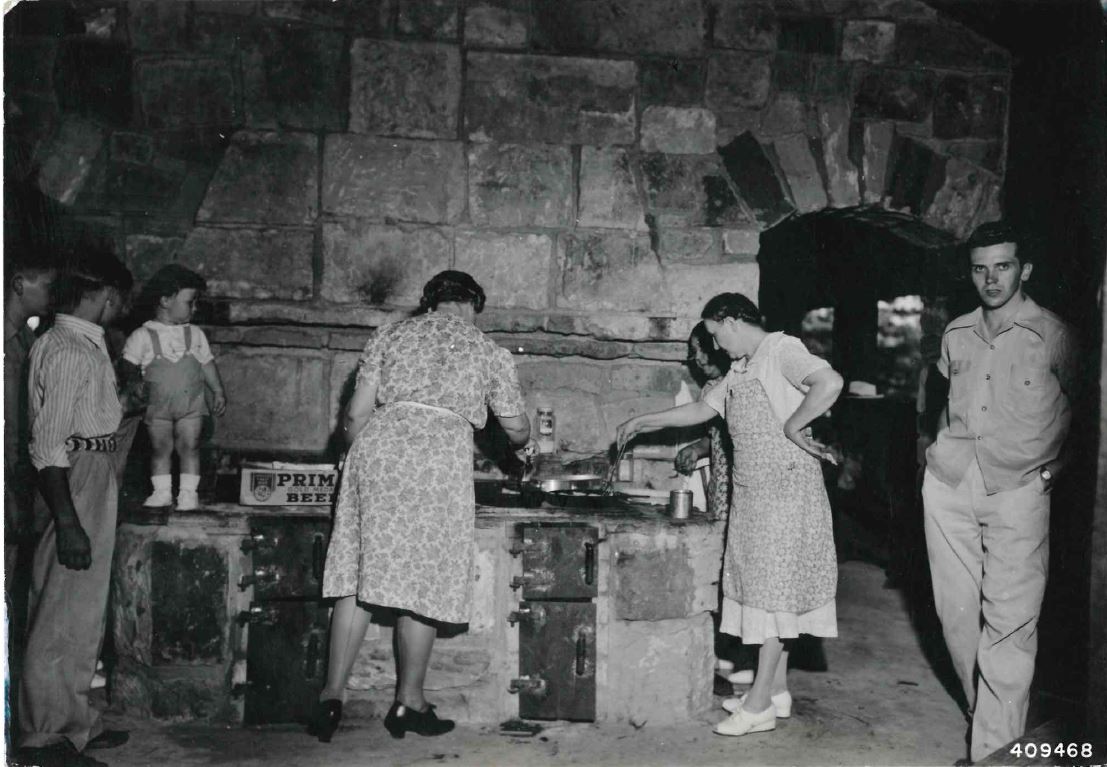Goose Bay Shelter, IL 2024

Join us in restoring the Goose Bay Shelter located on the banks of Lake Glendale!
PROJECT PARTNER: Shawnee National Forest
SESSION DATES: August 11-16 and August 18-23
PROJECT SUPERVISOR: Daniel Ensalaco!
ASSISTANT PROJECT SUPERVISOR: Charles Dobry!
CREW LEADER: Marissa Hoffman!
Project Site Description & History
Established in the early 20th century as part of efforts to conserve and manage the American wilderness, Shawnee National Forest itself was designated a national forest in the 1930’s, during a period when the U.S. government sought to restore lands degraded by logging, agriculture, and mining.
Goose Bay Shelter was subsequently developed as part of this broader conservation initiative, designed to provide a refuge for hikers and nature enthusiasts exploring the forest’s rugged and diverse ecosystem. Positioned strategically to offer panoramic views and a rest stop along some of the forest’s popular hiking trails, the shelter became a beloved waypoint for visitors.
Over the decades, Goose Bay Shelter has witnessed numerous changes and challenges reflecting broader environmental and policy shifts. As public awareness and interest in environmental preservation grew through the latter half of the 20th century, the shelter served not only as a physical sanctuary but also as a focal point for educational programs and conservation efforts.
It has been part of initiatives to protect local flora and fauna, combat invasive species, and maintain the health of the forest’s ecosystems. The shelter itself, while modest in structure, stands as a testament to rustic architecture and the ethos of minimal impact on the surrounding landscape.
Through years of use, the shelter has been maintained and occasionally renovated to preserve its character and functionality, ensuring that it continues to be a part of the Shawnee National Forest experience. If your looking for a tranquil volunteer opportunity accompanied with a lakeside vista, we encourage to join us in Illinois this summer at the Goose Bay Shelter! For more information, please visit Shawnee National Forest’s website for the Lake Glendale Recreation Area.




Location and Logistics
SESSION DATES: August 11-16 and August 18-23
Please plan to arrive at the campsite no earlier than 5pm and no later than 7pm on the first day of your session.
LOCATION: Located roughly 2.5 hours south of St. Louis, MO.
MAP to GOOSE BAY SHELTER
CAMPSITE INFORMATION:
![]()
![]()
![]()
![]()
![]()
![]()

![]()
![]()
Tents, truck campers, campervans, and trailers up to 25 feet can access our campground. Hookups and showers are available and dogs are allowed but must be leashed. Bring your kayak or swim trunks!
WEATHER: Anticipate highs in the 80s and lows in the 60s. Weather conditions may be rainy, cloudy, or sunny. Volunteers are responsible for checking weather conditions before their session begins, and packing appropriately.
ABOUT VOLUNTEERING: HistoriCorps projects are free for volunteers! HistoriCorps will provide all meals, tools, training, equipment, and a campsite. Volunteers are responsible for their own transportation to the campsite, sleeping equipment, work gloves, clothes and boots, and other personal gear.
Scope of Work
SCOPE OF WORK DIFFICULTY: 
HistoriCorps is committed to educating and training volunteers in preservation skills, with an overarching mission of inspiring a preservation ethic in all those involved. Learning and working alongside expert HistoriCorps field staff, volunteers and applying the traditional skills necessary to restore Goose Bay Shelter:
- Repoint mortar on chimney and walls
- Repair fireplace and exterior stairs
- Rebuild kitchen on backside of fireplace
Please note: Tasks vary by day and by week, depending on a variety of factors including: weather, project priorities, previous groups’ work, and more. Though it is likely you will get to learn and practice most or all of the above tasks, it is not guaranteed. The higher percentage of the scope a particular task is, the more likely you will get to practice it.
Sign Up!
We’re thrilled this project has inspired you to volunteer!
CLICK HERE TO REGISTER!
Visit our Job Calendar to see spaces are available!
*All registrations submitted to projects at capacity will be automatically added to our waitlist.*
CANCELLATIONS effect our ability to complete projects. Please register only if you are certain about your ability to participate.
You will know your registration was successful when you receive a confirmation email. Contact volunteer@historicorps.org for assistance.
HistoriCorps does not charge for its volunteering projects. HistoriCorps relies on donations to continue engaging volunteers to save significant historical sites across America for generations to come. Your donation of any amount will make an incredible difference! Increase your impact – make a generous gift today.
Volunteer Logistics, Policies, and Advice
We’re so glad you’re interested in joining this project! If you’re new to our community, review the Volunteer FAQ first! Please note the following logistics and policies:
- Volunteering with HistoriCorps is free! We will provide all meals, tools, training, equipment, and a campsite or shared indoor lodging. Dinner is not provided on the first night.
- Volunteers are responsible for bringing their own gear, work gloves, sturdy work clothes and boots, and appropriate sleeping equipment. Check the average temperatures before you start packing – the nights and mornings may be colder than you anticipate! Then, read this advice about how to stay warm when tent camping in colder places.
- Campsite accessibility varies by project. Some projects can accommodate tents only; others can accommodate small RVs. Please review the project site description above for more information, and if you’re still not sure, email volunteer@historicorps.org for help.
- If this project does not offer showers, you might want to consider bringing a solar shower or research other methods to clean up after the work day.
- Volunteer crew sizes generally range from 4-8 volunteers, with two HistoriCorps staff that lead and train volunteers in the work.
- Safety is one of HistoriCorps’ top priorities, and volunteers can contribute to a safe working environment by ensuring their physical fitness is adequate for the work. See above for this project’s scope of work and difficulty level. Please, call us if you are not quite sure if a project is a good fit for your skills or fitness level. We may be able to suggest a project more suitable and enjoyable for you.
- Hard hats, eye protection, ear protection, gloves are standard personal protection equipment (PPE) required on all projects. Hard hats must be worn at all times on the project site, unless working in a designated safe space. Field staff will train volunteers on correct use of PPE.
- Dogs are generally allowed to accompany their humans in project campsites (actually, we love having dogs join us around the campfire!). Dogs are not permitted on the job site for everyone's safety. HOWEVER: HistoriCorps also follows the rules and regulations of our project partner. If the project partner does not permit dogs onsite then HistoriCorps is no exception. Please ask HistoriCorps or the project partner directly if you have any questions about whether Fido is welcome.
